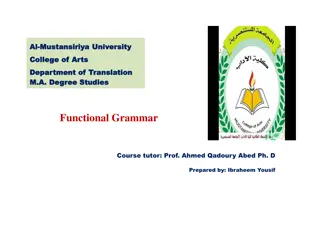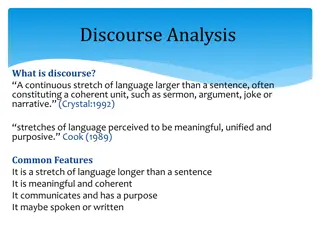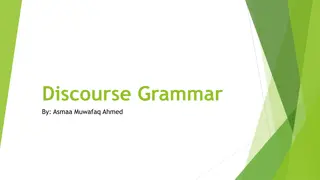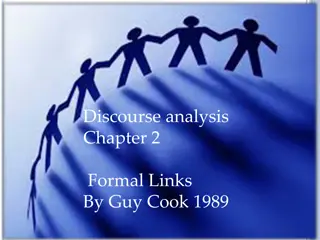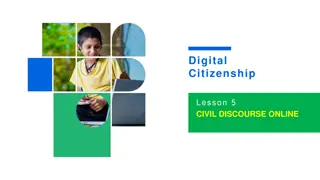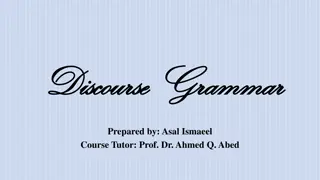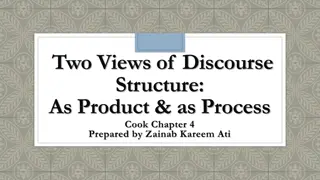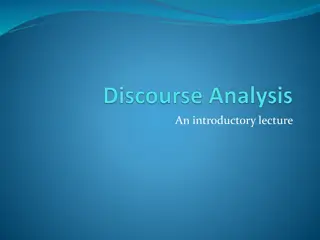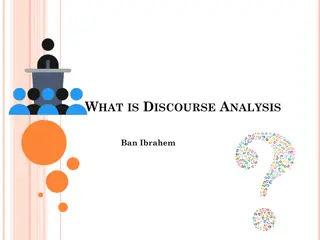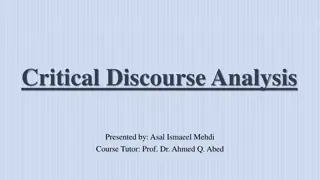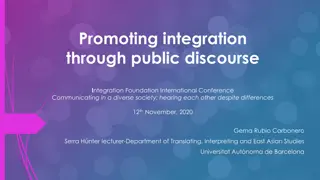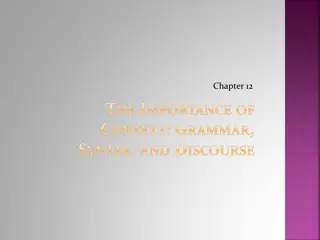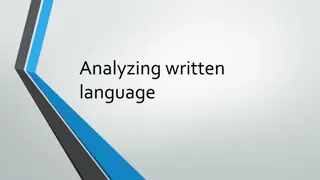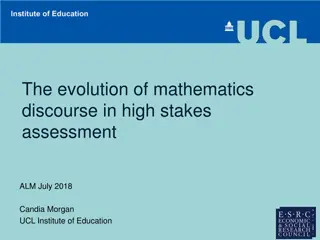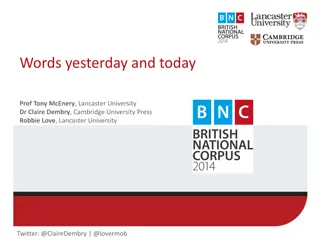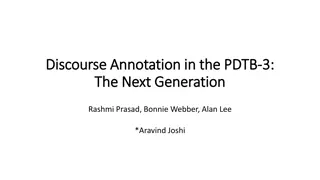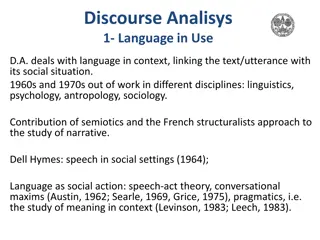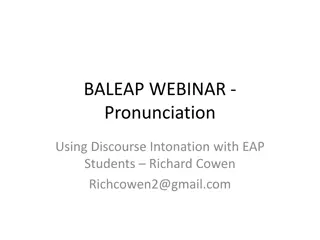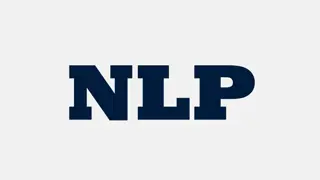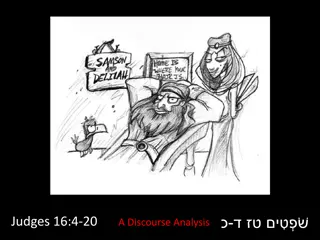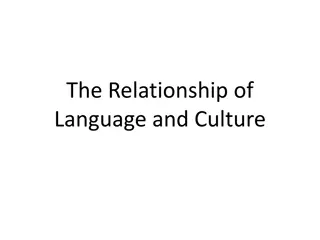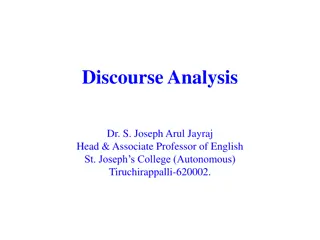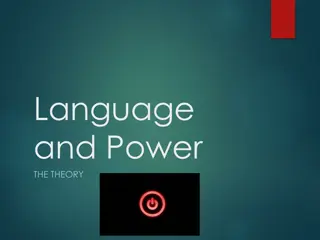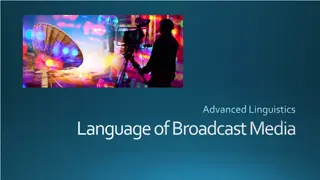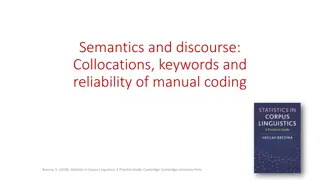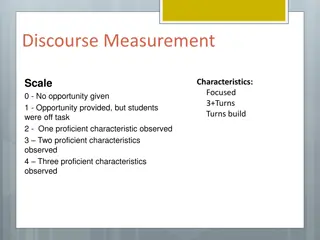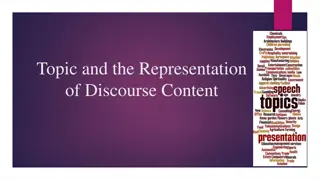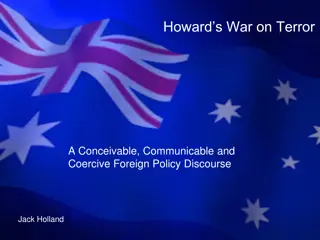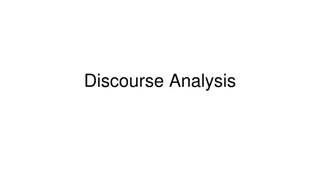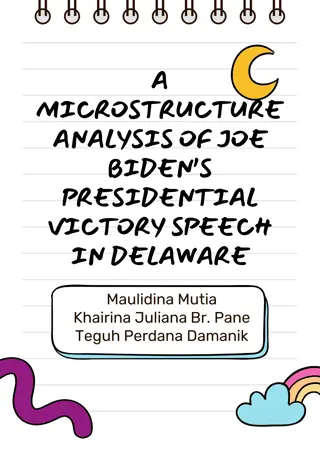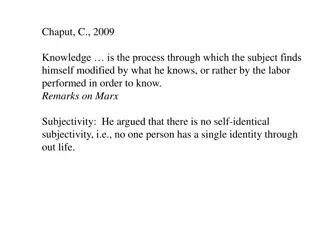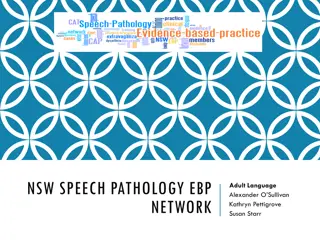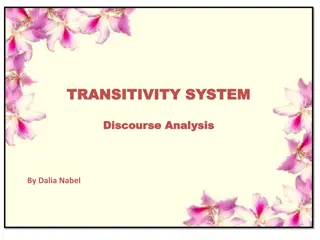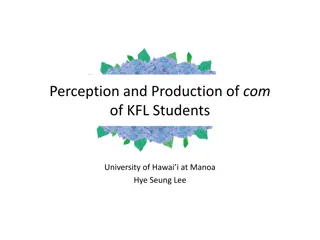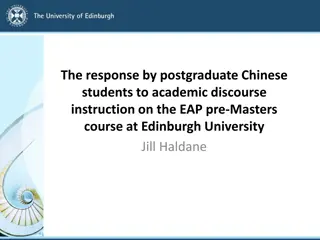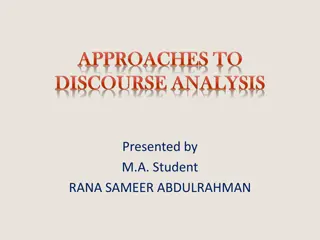Academic Language Demands and Supports in Instructional Planning
Academic Language Demands and Supports are crucial in educational settings to ensure comprehension and usage of language by students. This content discusses embedding language demands in lesson plans, providing language supports, and peer review activities to enhance academic language skills. The fo
6 views • 10 slides
Importance of Context in Discourse Analysis
Understanding context is crucial in discourse analysis as it helps interpret the meaning of words based on physical, social, and psychological factors, as well as the temporal and spatial dimensions of communication. Three key types of context include situational, background knowledge, and co-textua
1 views • 12 slides
Language and Communication in Society: Understanding Interactions
Explore the intricate relationship between language and society through lectures focusing on language in interaction, power dynamics, language contact and change, public space discourse, linguistic landscaping, and more. Delve into the shift from structural linguistics to societal communication, red
6 views • 28 slides
Understanding Systemic Functional Linguistics in Contemporary Language Studies
Explore the role of language in everyday life, the principles of Systemic Functional Linguistics, and the application of discourse analysis in translation. Delve into the Hallidayan model of language and discourse, examining genre, register, sociocultural environment, and more.
0 views • 20 slides
Understanding Discourse Analysis: Language in Context
Discourse analysis involves examining larger language units beyond sentences, such as conversations, lectures, and written texts, to understand their coherent meaning and purpose within specific contexts. Emerging in the 1970s, this field shifts focus from idealized language structures to the intera
2 views • 47 slides
Understanding Discourse Grammar and Cohesion in Linguistics
Explore the concepts of substitution, ellipsis, and cohesion in discourse grammar through examples and explanations. Discover how elements like nominal, verbal, and clausal substitutes, as well as ellipsis, play a vital role in creating cohesive patterns in language usage.
1 views • 38 slides
Understanding Discourse Analysis: Formal Links and Contextual Connections
Discourse analysis involves examining language beyond grammar rules, focusing on formal links within sentences and contextual connections outside of language. Guy Cook discusses how formal features shape discourse meaning and how verb forms influence sentence coherence. The use of parallelism in spe
3 views • 22 slides
Civil Discourse Online in Digital Citizenship Lesson 5
This lesson focuses on civil discourse online through a class debate about whether there should be homework assignments in school. Students engage in a structured Twitter debate, showcasing pros and cons in a respectful manner. Reflections on the debate encourage understanding differing viewpoints a
2 views • 10 slides
Understanding Grammar in Discourse: A Comprehensive Analysis
Recent discourse-based perspectives on grammar discuss how linguistic items exhibit diverse patterns when analyzed within longer texts. Scholars like Hughes, McCarthy, Halliday, and Hassan emphasize the cohesion and unity of texture in text through grammar and vocabulary patterns, connecting meaning
2 views • 34 slides
Understanding Discourse Structure in Linguistics
Pragmatics explores the relationship between language and the world, while discourse is seen as an interactive totality. Rank structures, as in linguistics, help analyze the grammar of sentences. The Birmingham School of Discourse Analysis pioneered influential studies in this field, focusing on sch
1 views • 29 slides
Understanding Discourse Analysis: An Overview
Discourse analysis is the study of language in use within its social context. It involves analyzing written or spoken language to understand how it is employed in real-life situations. This research method focuses on the purposes and effects of language, cultural conventions, communication of values
3 views • 22 slides
Understanding Discourse Analysis: Origins and Definitions
Discourse analysis, a method for analyzing connected speech or writing, was first coined by Zelling Harris in 1952. The term "discourse" has varied meanings and has its roots in Latin. It encompasses extended language units that have unity and purpose. Discourse is one of the four language systems a
0 views • 11 slides
Introduction to Critical Discourse Analysis (CDA)
Critical Discourse Analysis (CDA) is the study of language use in social contexts, integrating social theories with discourse analysis methods. Originating in the 1970s as Critical Linguistics (CL), CDA evolved to focus on how language reflects and shapes social meaning. The relationship between CL
0 views • 32 slides
Promoting Integration Through Public Discourse: International Conference Insights
Public discourse plays a crucial role in shaping societal perceptions of diversity and integration. The Integration Foundation International Conference delved into communicative practices that both promote and hinder integration, emphasizing the responsibility of public communicators in constructing
6 views • 15 slides
Understanding Grammar, Syntax, and Discourse in Biblical Texts
Explore the significance of context in analyzing grammar, syntax, and discourse in biblical Greek and Hebrew texts. Learn about the foundational elements, word order, Greek syntax basics, and the importance of discourse analysis. Delve into the definitions of grammar, syntax, and discourse, and unde
1 views • 30 slides
Understanding Discourse Analysis: Exploring Language & Power
Delve into the world of discourse analysis to uncover the intricate connections between written language, social contexts, and power dynamics. Explore topics such as text and discourse analysis, critical discourse analysis, and the impact of unequal power relations on communication.
0 views • 30 slides
Evolution of Mathematics Discourse in High Stakes Assessment
This study explores changes in school mathematics discourse over the past three decades in England through high stakes GCSE examinations. It analyzes the impact of these changes on classroom practices and student mathematical engagement, emphasizing the role of language in shaping mathematical exper
0 views • 50 slides
Words Yesterday and Today Research Project by Prof. Tony McEnery and Dr. Claire Dembry
Explore the Words Yesterday and Today research project led by Prof. Tony McEnery from Lancaster University and Dr. Claire Dembry from Cambridge University Press. This project delves into language usage trends, linguistic analysis, and social media discourse. Join the conversation on Twitter with @Cl
0 views • 14 slides
Understanding Discourse Coherence and Annotation in PDTB
NLP research on discourse coherence explores relations between events and propositions expressed in text, with a focus on combining individual relations into complex coherence structures. The PDTB approach annotates low-level relations in corpora to derive emergent high-level structural representati
0 views • 40 slides
Understanding Discourse Analysis: Language in Social Contexts
Delve into the realm of discourse analysis focusing on the connection between language usage and social settings from the perspectives of linguistics, psychology, anthropology, and sociology. Explore the works of key figures like Dell Hymes, M.A.K. Halliday, and the contributions of semiotics and Fr
0 views • 40 slides
Understanding Discourse Intonation in English Language Teaching
Discourse Intonation (DI) in English language teaching focuses on the significance of intonation in conveying meaning within spoken discourse. It involves key components such as prominence, tone, key, and termination. DI can help students and teachers by providing a framework for analyzing intonatio
0 views • 11 slides
Analyzing Discourse Structures in Natural Language Processing
This content explores various aspects of NLP including discourse analysis, parsing, rhetorical relations, and argumentative zoning. It delves into understanding text structures, relationships, and the use of different rhetorical devices. Examples and illustrations are provided to aid comprehension a
0 views • 8 slides
Discourse Analysis of Judges 16:4-20 in the Book of Judges
This discourse analysis delves into the narrative structure and linguistic features of Judges 16:4-20 from the historical and hortatory discourse found in the biblical text. The analysis explores the usage of various verb forms, transitions, and narrative genres to uncover deeper insights into the t
0 views • 45 slides
The Intricate Relationship Between Language and Culture
Language serves as a vital tool for social interaction, intricately woven into the fabric of culture. It expresses, embodies, and symbolizes cultural realities. In the interplay of nature and culture, language immortalizes and transforms elements like roses, embodying essential aspects of society. T
0 views • 9 slides
Understanding Discourse Analysis: A Comprehensive Overview
Discourse analysis involves the study of language usage in different contexts, encompassing various aspects such as applied linguistics, rhetoric, and pragmatics. It aims to uncover how meanings are created, challenged, and changed through communication. By analyzing discourse, we can gain insights
0 views • 41 slides
Understanding Language Anxiety in Foreign Language Learning and Teaching
Explore the impact of language anxiety on students and teachers in foreign language learning and teaching contexts through insights from Dr. Christina Gkonou's research. Delve into the theoretical background, implications for language education, and real-life experiences shared at the Essex Language
0 views • 25 slides
Exploring Language, Power, and Influence in Discourse
This comprehensive content delves into various theories and concepts related to language, power, and discourse, covering topics such as instrumental vs. influential power, discourse analysis, and the role of humor and politeness in communication. It discusses how language is used to convey authority
0 views • 13 slides
Insights into Advanced Linguistics and Media Broadcasting
Delve into the language of broadcast media, exploring features of TV news broadcasts, conditions of news interview discourse, types of interviews, and radio phone-in discourse. Learn about the intricacies of language used in different media contexts and the role of communication in broadcasting.
0 views • 7 slides
Statistical Analysis of Discourse in Corpus Linguistics
Statistical analysis plays a crucial role in understanding the complexities of discourse in corpus linguistics. This involves exploring collocations, keywords, and the reliability of manual coding in linguistic research. The relationship between the fluid nature of discourse and the rigour expected
0 views • 21 slides
Effective Practices for Mathematics Discourse
Utilize the practices of Anticipating, Monitoring, Selecting, Sequencing, and Connecting to improve student engagement and learning outcomes in mathematical discourse. These strategies enable teachers to guide discussions effectively, address student needs, and promote mathematical understanding. By
0 views • 21 slides
Understanding Discourse Analysis and Topic Representation
Discourse analysis involves studying fragments of conversations and deciding on their boundaries. Identifying these boundaries can be explicit or implicit, using markers like formulaic expressions or intuitive notions. The notion of topic serves as a unifying principle in discourse, helping differen
0 views • 28 slides
Australia's Foreign Policy Discourse in Howard's War on Terror
Australian foreign policy under Howard's leadership during the War on Terror was shaped by a unique language and discourse that made it conceivable, communicable, and coercive. The narrative explores the contextual background, theoretical framing, and response to events like 9/11 and Afghanistan, em
0 views • 11 slides
Understanding Discourse Analysis and Its Components
Discourse analysis focuses on linguistic units beyond single utterances, exploring the structure and coherence of spoken or written language. This analysis delves into defining discourse, providing examples, and discussing the criteria for qualifying a text as discourse. Through cohesion, coherence,
0 views • 15 slides
Analysis of Joe Biden's Presidential Victory Speech Microstructure in Delaware
Focused on critical discourse analysis of Joe Biden's victory speech in Delaware, this study applies qualitative research methods using van Dijk Critical Discourse Theory. The analysis reveals elements of microstructure in the speech, emphasizing linguistic aspects such as semantic, syntactic, styli
0 views • 14 slides
Understanding Knowledge Formation and Power Relations in Foucault's Discourse Theory
Knowledge formation and power relations are intricately interconnected in Foucault's discourse theory. The process of knowledge acquisition shapes individual subjectivities, while institutions normalize these subjectivities through societal practices. Foucault explores the archeology of discourse, g
0 views • 13 slides
Evidence-Based Practices in Discourse Treatments for Aphasia
This research review explores the effectiveness of discourse treatments for aphasia, focusing on improvements in discourse that lead to better outcomes for individuals with aphasia. Various treatment techniques and outcome measures are discussed, highlighting the potential benefits of specific inter
0 views • 14 slides
Understanding Transitivity in Discourse Analysis by Dalia Nabel
Transitivity in discourse analysis involves the selection of linguistic elements to encode meaning, reflecting mental images of reality. Examining processes like material and mental actions, it explores how language users portray experiences. Simpson's model highlights how speakers and writers const
0 views • 15 slides
Understanding the Use of 'Com' as a Politeness Marker in Korean Language Discourse
Korean discourse often utilizes 'com' as a discourse marker with hedging functions to mitigate face-threatening acts. This study explores the perception and production of 'com' among Korean as a Foreign Language (KFL) students at the University of Hawai'i at Manoa. It delves into the pragmatic aspec
0 views • 31 slides
Academic Discourse Instruction for Postgraduate Chinese Students at Edinburgh University
The study explores the response of postgraduate Chinese students to academic discourse instruction in an EAP pre-Masters course at Edinburgh University. Various aspects such as effective academic writing, meta-discourse in persuasive writing, and concession relations in argumentation are analyzed. R
0 views • 25 slides
Analysis of Discourse Styles in Therapeutic Conversations by Labov and Fanshel
Labov and Fanshel's non-critical approach to discourse analysis focuses on the heterogeneity of conversation styles, emphasizing shifts between frames and the importance of paralinguistic cues in therapeutic discourse. They identify different styles associated with various frames, such as interview
0 views • 14 slides



